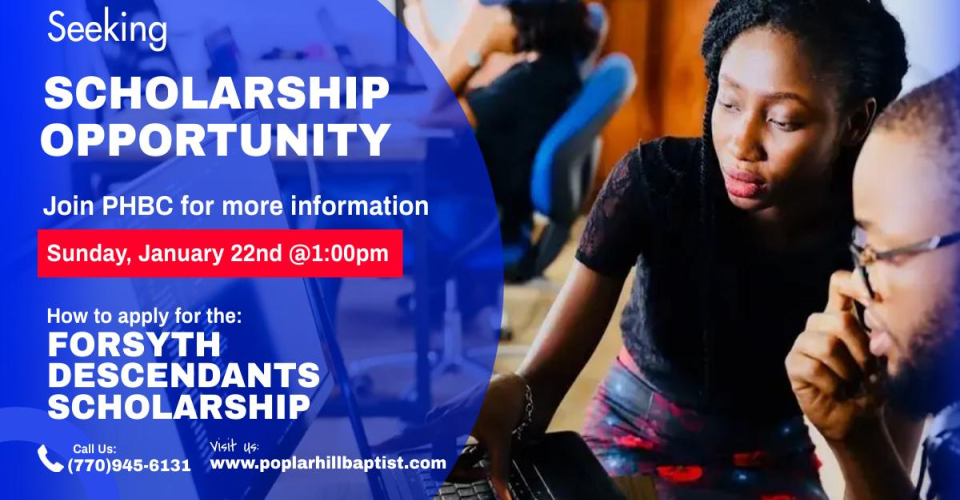Sincere stewardship: the efforts of the Forysth Descendants Scholarship & Atlanta History Center
- Jan 25, 2023
- 4 min read
On Sunday, January 22nd (2023), something special takes place.
It's more than just playoff football or Sunday service; it's a checkpoint to measure how far the efforts of the faith community and others in Forsyth County (GA) and the larger community are coming together to acknowledge an atrocity, but do something to build bridges, mend fences, and position the same community for something positive and constructive.
In February 2022, the Day of Remembrance (click HERE to read our article) sets the tone for conversation on the Massacre of 1912, as the Black/African-American residents are forced out via hackneyed reasons, resulting in numerous lynchings, forced takeover of their property, and expulsion from the county. For far too long, descendants of those who are victimized did not return as this checkered piece of history is something too many wanted to remain uncovered and discussed.
Thanks to the hosting of last year's event by immediate past Representative Carolyn Bourdeaux, a coalition of those from the faith community and interlocking community come together to establish the Forsyth Descendants Scholarship. With a focus on providing higher education funding opportunities for descendants of the racial cleansing and purging, the hope is to not only make an initial step to "bridge the gap", but establish a dialogue for improved community engagement and enhancement.
Sunday's town hall at Poplar Hill Baptist Church shows when two or more are gathered, positive things can take place (click HERE for our preview).
Complimented by the efforts of the Atlanta History Center, Sunday's roundtable provides a progress report of the growth taking place, along with the direction both entities plan on taking to not only tell this story, but expand upon the range of outreach and service in the county.
Adrienne Hershey (of the Forsyth Descendants Scholarship) provides a point of reference on the program (which in its inaugural year, provides 9 awards up to $10,000 per recipient), including the ongoing efforts for increased collaboration hastened by Durwood Sneed and others (including the church's pastor, Avery Headd) for funding to provide more scholarship opportunities. With an eye on possible expansion of community programming and services, it's about acknowledgement of a difficult and horrible history, yet asking the question via the lens of Christianity and concern for the human condition of what can an individual do, let alone a committed collective of community stewards and servants (refer to the following video):
The added presence of the Atlanta History is a sign of a growing momentum of making sure there's an enhanced sense of research and collection of the oral history behind this event. Spurned by the questions of "What happened/where did they go", Sophia Dodd, along with Kristian Weatherspoon and Monique Rojas, are leading a concerted effort in telling the untold (and undertold), along with providing as sound a context and point of reference for this incidence. In working from the facts, it's about making sure to reach a broader audience and identifying next steps in preserving history and using it for broader community building (refer to the following video):
Following the respective organizations' presentations, a sound debriefing session moderated by Pastor Headd takes places; the insightful and engaging discussion provides the following key points for discussion (among others):
The importance of capturing and publishing oral history from the descendants. This includes capturing the oral histories of Caucasian and other groups who are part of the larger story of what takes place in 1912.
Connecting with resources including (but not limited to) the Forsyth Historical Society for additional data.
Understanding how important and imperative it is to work this project (on the scholarship and center sides) together.
Making sure to interview as many as possible with direct ties to what happens in 1912.
Understand on how trauma impacts why or why not certain topics are or are not discussed.
Continued engagement and connecting with the descendants for continued collection of data/history.
Continued fundraising and grants/partnerships to augment the scholarship along with potential expansion of community focused programming.
Hearing and healing going hand in hand.
Continued sharing and amplification of the work taking place through these and related projects.
While there may not be a single act which fully reconciles what takes place 111 years ago, it does not mean people cannot do something to spark conversation and sincere action to make things better. Given the actions over the past year, there's clearly something different taking place in Forsyth County and in the immediate area.
When stewardship is sincere, there's a clear and positive energy on what's next.
Notes: All photos and video are recorded by Andrew Snorton. Included in the photos are snapshots of Monique Rojas, Sophia Dodd, and Christine Levingstone (left to right/1st photo) and Adrienne Hershey (3rd photo), Pastor Headd (5th photo), Ms. Elon Butts-Osby (6th photo), Gwinnett County Judge Rodney Harris (7th photo), Immediate past Representative (GA-7) Carolyn Bourdeaux (center/holding the microphone in the 9th photo), and Jason DeFranco of the Gwinnett County Public Library system (10th photo).
The scholarship program will start accepting applications from February 1st through April 30th (2023). You may visit their website or email forsythscholarshipfund@gmail.com for more details. To learn more about the oral history project, you may email sdodd@atlantahistorycenter.com or call 404-814-4104.
















































Comments